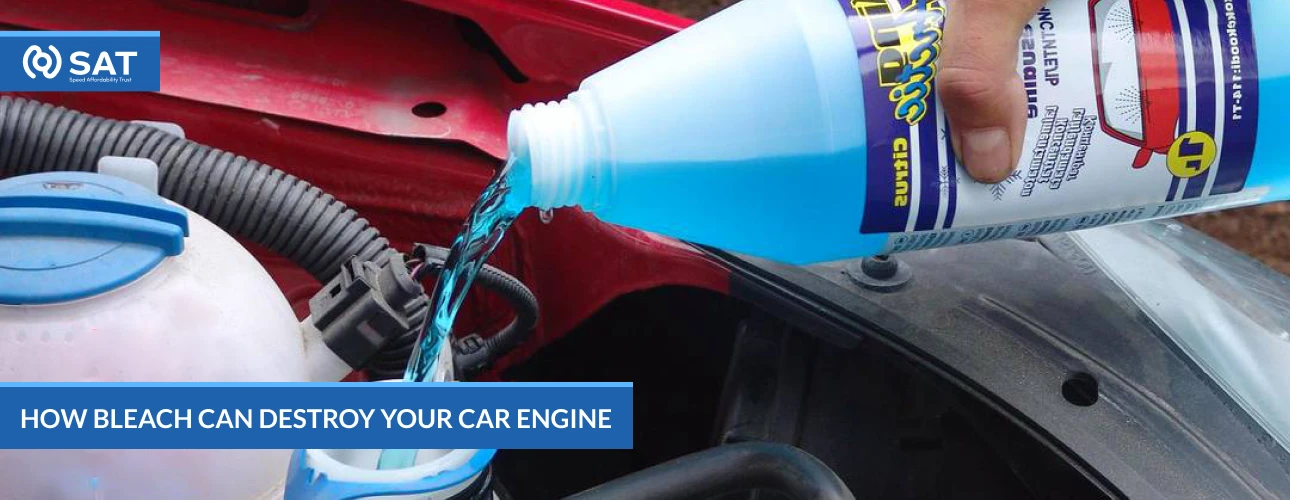Bleach is an excellent cleaning agent that will tear up tougher stains off surfaces and kill germs. This trait, however, makes it quite unfit to be run in a car engine. Introduction of the bleach to the car’s engine may result in vast damages that, upon repair, could be very expensive, or might end up being totally “shot.” This information, keeping in mind the effects of Bleach in Car Engine and why it should never come into contact with automotive components, is very vital for every owner of an automobile.
What Does Bleach Do to a Car Engine?
It Corrodes All the Metal Components
Bleach is mainly composed of sodium hypochlorite, a highly corrosive substance. When this comes into contact with the metal parts in an automobile engine, such as the block, pistons, and valves, it involuntarily corrodes this metal. Such corrosion of the metal parts weakens them and can lead to possible component failure. This will cause severe destruction to some very critical parts of the engine over time and can be the cause of poor performance and durability.
Damage to the Seals and Gaskets of the Engine
Seals and gaskets are localized inside the engine to ensure that no fluid is let out, and it remains within the sections to which it is supposed to belong. The bleach in car engine is going to destroy these through the breakdown of the rubber and synthetic materials, which comprise the seals and gaskets; this can result in leaking of fluids considered vital to the engine, such as coolant, oil, and transmission fluid, from the engine to the other parts, destroying them in the process. Worst liquid to Put in Car Gas Tank like Coke can also have similar damaging effects on seals and gaskets, leading to leaks and engine damage.
Contamination of the Fluids in the Engine
When bleach enters the engine oil or coolant system, it contaminates those fluids. Bleach reacts with the chemicals in motor oil and coolant and produces undesirable byproducts in the reaction. When contaminated, the engine oil does not lubricate properly, which increases friction and reduces the lifespan of the engine parts. Similarly, contaminated coolant might cause overheating or Water Enters your Gas Tank, hence damage to the cooling system of the engine.
Chemical Reactions
Bleach can mix and react with other chemicals and materials that are inside the engine. For example, it reacts with antifreeze or other additives added to the coolant system, forming some dangerous compounds. This might clog up the cooling system and cause overheating, which subsequently can lead to damage to the radiator and hoses, finally resulting in engine failure.
Can Bleach Damage a Car Engine?
Yes, bleach can cause a good deal of damage to any car engine. The corrosiveness in bleach is extremely harmful to any part of the engine and its fluids and seals. Such is putting bleach into any engine, which can bring about:
Corrosion and Rust:
Chronic exposure to this bleach may lead to rust and corrosion on metal parts that can lead to mechanical failure.
Leakage:
Seals and gaskets damaged by the bleach can cause critical leaks of the essential engine fluids, thus risking poor performance and safety.
Poor Engine Performance:
Corrosion of parts and contaminated fluids lower engine efficiency, resulting in poor performance and high fuel consumption. The cumulative action may eventually cause the failure of the engine in severe cases, resulting in very expensive repairs or even replacement.
What to Do if Bleach is Accidentally Introduced
If bleach is accidentally introduced into a car engine, it’s essential to act fast:
- Stop the Engine: If you suspect bleach may have gotten into the engine, turn it off immediately. This will prevent any further damage.
- Drain and flush fluids: Drain out contaminated fluids, which include oil in the engine and coolant. Flush the engine properly to remove residual bleach.
- Check and Replace Contaminated Parts: Let a professional mechanic scan the engine for its needs by checking for any corrosion or damage on the parts, seals, and gaskets. Replace all the damaged parts.
- Seek Professional Assistance: Call in a professional mechanic to ensure that the flushing of the engine is done properly and all the possible damages are replaced.
Take Caution with Bleach
Bleach is a very corrosive substance and is, therefore, highly effective for cleaning and disinfecting. This attribute should not be used to clean an automotive engine. It can lead to corrosion, seal and gasket deterioration, contamination of the engine fluids, and, finally, some engine failure. Now, knowing all the havoc that bleach can cause if ingested into the motor, you are on watch to take immediate remedial action should it ever happen, and hence avoid any unwanted replacement or repair costs for the protection of life and dependability of your vehicle. Impact of Coke on your Car Engines can also cause significant damage if not handled properly. Always be careful, and if you believe there could possibly be some damage in your engine, never hesitate to see a professional mechanic.




